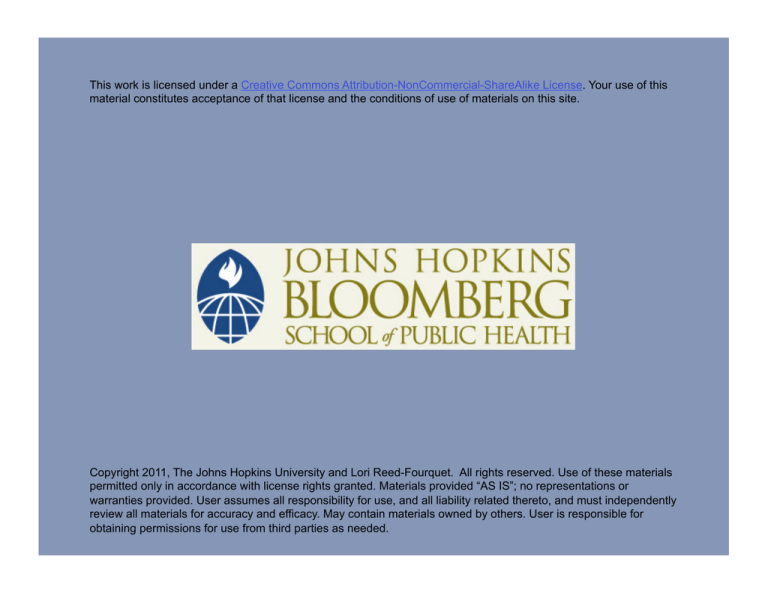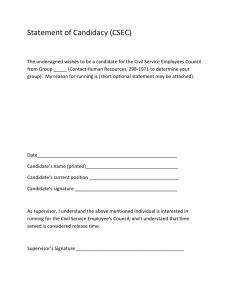
This work is licensed under a Creative Commons Attribution-NonCommercial-ShareAlike License. Your use of this
material constitutes acceptance of that license and the conditions of use of materials on this site.
Copyright 2011, The Johns Hopkins University and Lori Reed-Fourquet. All rights reserved. Use of these materials
permitted only in accordance with license rights granted. Materials provided “AS IS”; no representations or
warranties provided. User assumes all responsibility for use, and all liability related thereto, and must independently
review all materials for accuracy and efficacy. May contain materials owned by others. User is responsible for
obtaining permissions for use from third parties as needed.
Section B
Standards Harmonization: Standards Selection
Standards Selection
Identify available candidate standards
Weighting
Constraints
Gap analysis
3
Candidate Standards: HI Standards Bodies
ASTM: American Standards for Testing and Materials
- E31.15: Healthcare Information Capture and Documentation
-
E31.25: Healthcare Data Management, Security, Confidentiality,
and Privacy
-
-
E31.35: Healthcare Data Analysis
E31.90 Executive
4
Candidate Standards: HI Standards Bodies
ISO TC215: Health Informatics
- WG 1 Data Structure
-
-
-
-
-
-
-
-
-
WG 2 Data Messaging
WG 3 Semantics Content
WG 4 Security, Safety, and Privacy
WG
WG
WG
WG
5
6
7
8
Health Cards
Pharmacy and Medication Business
Devices
Business Requirements for an EHR
WG 9 Joint Initiative Council
Operations, Harmonization, Executive Council
5
Candidate Standards: HI Standards Bodies
HL-7 – Health Level 7
- CCOW
- Clinical decision support
-
-
-
-
-
-
-
-
-
-
Control/query
Education (admin.)
Financial mgmt.
Electronic health records
Implementation (admin.)
Marketing (admin.)
Medical records
Modeling and methodology
Orders/observations
Personnel management
-
-
-
Patient administration
Patient care
-
Public health and
emergency response
-
-
Publishing (admin.)
Regulated clinical research
info mgmt.
-
-
-
-
-
Security
Process improvement
(admin.)
Scheduling and logistics
Structured documents
Tooling (admin.)
Vocabulary
6
Candidate Standards: HI Standards Bodies
NCPDP: National Council for Prescription Drug Programs
- WG1 Telecommunication
-
-
-
-
-
-
-
-
-
-
-
WG2 Product Identification
WG3 Standard Identifiers
WG4 Provider/Member Enrollment
WG5 Payment Reconciliation
WG7 Manufacturer Rebates
WG9 Government Programs
WG10 Professional Pharmacy Services
WG11 Prescriber/Pharmacist Interface
WG12 Education—Legislation and Regulation
WG14 Long-Term Care
MC Maintenance and Control
7
Candidate Standards: HI Standards Bodies
ASC X12N: Insurance/TG02-HEALTHCARE
- WG1 Health Care Eligibility
-
-
-
-
-
-
-
-
-
WG2 Healthcare Claims
WG3 Claim Payments
WG4 Enrollments
WG5 Claims Status
WG9 Patient Information
WG10 Health Care Services Review
WG12 Interactive Healthcare Claims
WG15 Provider Information
WG20 Insurance Transaction Acknowledgement
8
Candidate Standards: HI Standards Bodies
DICOM: digital imaging and communications in medicine
-
-
-
-
-
-
-
-
-
-
-
-
WG-01: cardiac and vascular
information
WG-02: projection
radiography and angiography
-
-
-
WG-03: nuclear medicine
WG-04: compression
WG-05: exchange media
-
-
-
WG-06: base standard
WG-07: radiotherapy
-
WG-08: structured reporting
WG-09: ophthalmology
-
WG-10: strategic advisory
WG-11: display function
standard
WG-12: ultrasound
WG-13: visible light
WG-14: security
WG-15: digital mammography
and CAD
WG-16: magnetic resonance
Wg-17: 3d
WG-18: clinical trials and
education
WG-19: dermatologic
standards
WG-20: integration of imaging
and information systems
-
WG-21: computed
tomography
-
-
WG-22: dentistry
WG-23: application hosting
9
Candidate Standards: HI Standards Bodies
IHE: Interconnecting the Health Care Enterprise
- IT infrastructure
-
-
-
-
-
-
-
-
-
Radiology
Laboratory
Cardiology
Discussing pharmacy
Patient care coordination (content)
Quality public health and research
Pharmacy
Anatomic pathology
Eye care
10
Candidate Standards: HI Standards Bodies
SCDI: Standards Committee on Dental Informatics
National, regional standards (e.g., European: CEN; Canadian:
COACH; …)
USP: United States Pharmacopeia
11
Candidate Vocabulary Standards: HI Standards Bodies
International classification of disease (ICD: ICD-9, ICD-10)
- Procedures
-
Current procedural terminology (CPT)
-
Diagnoses
Procedures
Systematized nomenclature of medicine-clinical terms (SNOMED-CT)
- Diseases, findings, procedures, microorganisms,
pharmaceuticals
12
Candidate Vocabulary Standards: HI Standards Bodies
National Council for Prescription Drug Programs (NCPDP)
- Drug products
RxNorm
- Clinical drugs
-
Drug delivery devices
LOINC
- Laboratory orders
- Laboratory results
13
Weighting Considerations
Suitability
- For the program or community
-
-
For the use case business requirements
Compliant with jurisdiction laws
Compatibility
-
-
Within program or community
Supporting information reuse
14
Weighting Considerations
Readiness
- First level—review standards development organization (SDO)
-
Second level—review within SDO
Ease of access
-
-
-
-
-
Lack of dominance (vendor neutrality)
Open/transparent (ability to influence standard)
Intellectual property/licensing terms (cost)
Consensus-based
Availability
15
Weighting Considerations
Code sets
- Used with other selected standards
-
-
-
-
How often are terms updated
Versioning of updates
Mapping to other domain, jurisdictional, or selected standards
Robustness or deficiencies in the code set
16
Constraints
Standards are flexible and may need specific constraints to support
the use case to attain interoperability
-
-
-
-
-
Message segment optionality
Document (XML) content module optionality
Security constraint options
Transport options
Vocabulary options
Interoperability specification (HITSP)
Profile (IHE)
Implementation guide (HL7)
17
Constraints: Example
Biosurveillance
-
Message segment optionality
Require support for segments containing surveillance data
-
Document (XML) content module optionality
Require support for content modules containing surveillance
data
Specified support for pseudo-identifiers
Security constraint options
-
Support pseudonymized and multi-patient access to shared
information resources
-
Transport options
Support both message and document sharing to maximize
availability of surveillance data
-
Vocabulary options
Require structured vocabularies from selected vocabulary
domain (SNOMED-CT, LOINC)
18
Gap Analysis
Identification of standards not available to fulfill the use case
Specification scoping to exclude functionality where gap is
identified
Gap resolution plans
- Provisional selections for standards in progress
- Plans to update existing standards
- Plans to request new standards
-
-
Plans to provide resources to develop new standards
Plans to update specification once gap is resolved
19
Gap Analysis: Example
Biosurveillance gaps
Identification of standards not available to fulfill use case
-
Subscription mechanism was not available
Requested new work from IHE IT-infrastructure
Document subscription (DSUB) profile developed
Document sharing was restricted to one-patient-at-a-time query
-
Initial specification removed constraint
Provided IHE IT-infrastructure committee feedback
Multipatient query was developed
Unable to express lab orders
-
-
Specification removed this from scope
LOINC subset requested
Unable to express reporting criteria
Specification removed this from scope
HL7 standardization request
20





